Fitness trackers: healthy little helpers or no-good gadgets?
“There’s a better version of you out there. Just get up and find it.” This motivational jibe is the tagline for the wearable-tech company Jawbone’s fitness tracking system. Its latest wristband promises to monitor your heart and chart your light, deep and REM sleep. It vibrates when you’ve been idle for too long, logs exercise and diet and estimates how many calories you burn. It will gently compare you to your peers and encourage you to set goals.
Twenty-five million fitness trackers such as the Jawbone, Fitbit or Nike+ FuelBand will be sold worldwide this year. Does this mean that 25 million more people will be saved from heart disease? That millions of fitness fanatics will grow fitter still? Or simply that 25 million people will have spent between £40 and £150 on a piece of rubber jewellery and another reason to sit on their backsides, narcissistically peeping at their phones? Peer-reviewed data on the latest fitness trackers’ efficacy is limited, because technological developments move faster than rigorous scientific research. But some interesting findings have already emerged. Lisa Cadmus-Bertram of the University of Wisconsin–Madison, took a group of 51 overweight, postmenopausal women and gave 25 of them Fitbits, while the remaining 26 used pedometers. The women with the Fitbits liked wearing the wristbands and using the website to monitor their progress. After a month, they had increased their moderate-to-vigorous physical activity by an hour a week. “Fitness trackers combine the key ingredients for motivating people to reach their health goals,” says Cadmus-Bertram. These are: “self-monitoring, setting goals, getting frequent feedback on your progress, revising goals as needed, social support and developing a sense of self-efficacy.”
This was, of course, a small initial study. Who is to say that these women didn’t then get bored and ditch the devices? Even so, Cadmus-Bertram says she was astonished at how many people continued to use them for the duration of the study.





